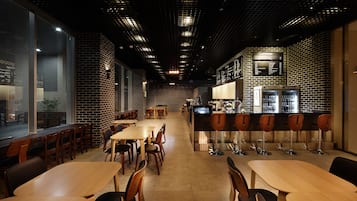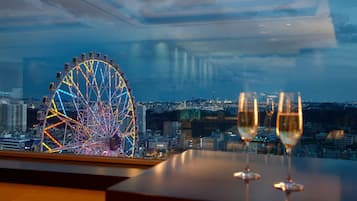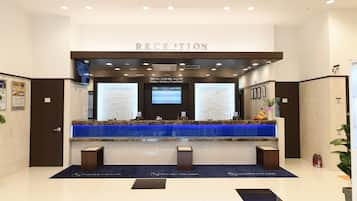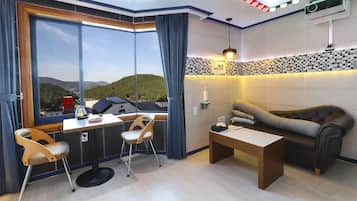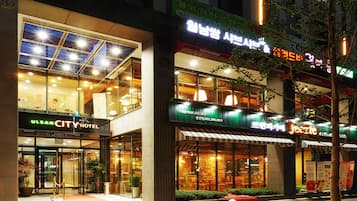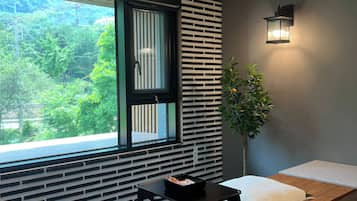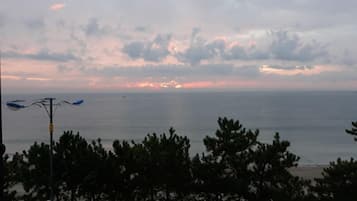Although it is known as an industrial city, Ulsan has just as many things to enjoy as other cities do. It is natural for a city that has grown with a sizeable population to need leisure and relaxation. Visit an enormous park that also features swimming and fitness facilities, enjoy a day at a beach with plenty of sunshine and fine sand, take a trip in search of whales, or stop by an observatory from which you can overlook the entire industrial complex of Ulsan.
Or, try a glass of unrefined rice wine (makgeolli) that is as refreshing as cold champagne at a makgeolli rice winery, a local specialty, and check out the scenes of Ulsan in the modern era at a museum that displays the industrial history of the city while witnessing the lives of our ancestors at a museum where traces from the prehistoric age to the Silla Period still remain. Hyundai Motor Ulsan Plant, which represents the automotive industry of not just Korea but also the world, is another place you should not miss in Ulsan.
- 1
Ulsan Grand Park
High-class green space with a variety of activities

- Couples
- Families
- Photo
Ulsan Grand Park is a nature-friendly, ecological city park that provides both culture and rest. Enjoy culture and experience nature and ecology while participating in various energy-filled programmes. You may take a slow stroll or ride a bicycle around a vast area of 2,052,936 square metres that is free of any admissions fee. It will be an incredible time of communicating with precious nature in the industrial city of Ulsan.
Take part in a variety of activities in many different facilities. The Aquasis that features a swimming pool, wave pool and slides is open in summer as well as in winter, and you can also learn how to swim through classes with a fee. At the fitness centre that takes care of the health of citizens, you can access many different kinds of fitness equipment at an affordable price, and, at the rose garden, zoo and ecology travel hall, you will be able to experience communicating with nature. The Kids' Theme Park is where you can spend an exciting time with your kids. Some of the facilities and stores have different hours of operation depending on the season and the day of the week, so we recommend you to check them out before you visit.
Location: 94, Daegongwon-ro, Nam-gu, Ulsan, South Korea
Open: Daily from 5 am to 11 pm
Phone: +82 (0)52-271-8816
Mapphoto by Dongchan0417 (CC BY-SA 4.0) modified
- 2
Ilsan Beach
White sandy beach where you can enjoy dynamic activities

- Couples
- Families
- Photo
Ilsan Beach spans 600 metres, curving gradually like a half moon in Ulsan. It’s a natural spot that offers both laidback and energetic activities. Waves are gentle thanks to its topography that curls in like an earthen pot, which is why there is no difficulty in sea bathing and water sports even for novice swimmers. As you sit on the beach made of fine sand and gaze out at the sea, the Daewangam Rock forest trail, which is basically a breakwater made by nature, unfolds before you like a painting.
The excitement for those who love thrilling experiences cannot be left out as well. When you ride an extreme boat, speed boat or banana boat to scud over the waters, the overflowing adrenaline will be too much to handle. If you are with your family, try a family boat or picnic boat. The time you spend on the sea in a quiet, relaxing manner will present you with great joy. At one of the restaurants or cafes located along the coastal road, you will be able to quench your hunger or thirst after hours of playing in the water, which will make your day even more satisfactory.
Location: Ilsan-dong, Dong-gu, Ulsan, South Korea
Phone: +82 (0)52-209-3363
Map - 3
Ulsandaegyo Observatory
Where the scenery of beautiful industrial complexes unfolds before you

- Couples
- Families
- Photo
Ulsandaegyo Observatory, which stands tall at 203 metres above sea level, is a place with beautiful sunsets and nightscape. Here, you can check out Ulsandaegyo Bridge, the longest single span suspension bridge in Korea and the third longest in the world that opened in May 2015, and also get a view of the three industrial complexes of Ulsan - petrochemical, automotive and shipbuilding - as well as the seven famous mountains of the city. As you watch the lights still turned on late at night at the industrial complexes, you may feel motivated to transform your mindset that has become lethargic by the idea of pursuing a work-life balance.
The observation desk on the third floor, which is surrounded by whole glass, allows you to enjoy the view comfortably regardless of the weather while the fourth-floor observatory offers a cool breeze and a chance to capture the beautiful scenery without any glass windows in the middle, which is why it attracts many photographers. As the day nears the evening, the sunset slowly disappearing over the mountains together with the lights that turn on one by one from the industrial complexes unfold before you like red plains. The gorgeous nightscape is a gift for those who have patiently waited for a long time.
Location: 155-1, Bongsu-ro, Dong-gu, Ulsan, South Korea
Open: Daily from 9 am to 9 pm (closed on 2nd and 4th Mondays of every month)
Phone: +82 (0)52-209-3345
Map - 4
Boksoondoga Rice Winery
Where refreshing champagne-like makgeolli (unrefined rice wine) is made

- Couples
Boksoondoga Rice Winery is where handmade makgeolli is brewed in pots by fermenting Korean rice and traditional yeast, which are produced in the region. Natural carbonic acids created during fermentation of yeast present a refreshing feel and taste like those of champagne. The rice wine is produced in small amounts by hand rather than mass production in a factory, so it'd be better to savour each and every sip of the wine.
The highlight of the rice winery experience is the tavern where you can try a glass of makgeolli together with a variety of side dishes. If carbonated coolness is the first taste, the subtlety of the soft and deep rice wine gives you a clean finish. If you purchase a bottle to take home, you can't open it right away; you need to keep opening and closing the bottle because of the carbonic acid attempting to fume out of the tall-necked bottle. But, after a few repeated motions of opening and closing, you will finally be able to taste the rice wine whose aroma has been tickling your nose. Get a little tipsy with the 6.5% alcohol content that spreads throughout your body and, even, buy some cosmetics made of makgeolli. You will not regret the long trip you've made to the winery.
Location: 48, Hyangsandong-gil, Sangbuk-myeon, Ulju-gun, Ulsan, South Korea
Phone: +82 (0)10-4870-0244
Map - 5
Ulsan Theme Botanic Gardens & Arboretum
Where you can meet a clear and green forest up close

- Couples
- Families
- Photo
The Ulsan Theme Botanic Gardens & Arboretum is one of the largest plant sanctuaries in the south-eastern part of South Korea. It houses over 1,500 species of plants across a total area of 51,159 square metres. Once you pass the ticket office, look through the exhibit greenhouse and walk past the botanical garden and sculpture park, you will arrive at the petroglyph waterfall park where you will find cool and refreshing streams of water falling down. In summer, a variety of events are held here.
After relaxing a bit under the shade at the wisteria rest area, walk by the Korean Peninsula Theme Park, which is an aquatic botanical garden, and then stop by the reptile experience centre. Here, you can enjoy a unique and amazing experience in which you can see and actually touch different kinds of reptiles that you probably have not had many chances to encounter. If you feel a bit tired by the time you return to the entrance of the park after checking out the broadleaf tree garden, maple leaf garden and fruit tree garden, take a moment to relax in the lounge or cafe. A day filled with fun memories should not be remembered for fatigue.
Location: 33-1, Soepyeong-gil, Dong-gu, Ulsan, South Korea
Open: November–February from 9 am to 5 pm. March–October from 9 am to 6 pm
Phone: +82 (0)52-235-8585
Map - 6
Seongnamsa Temple
Tranquil resting area that offers relaxation in all four seasons

- History
- Photo
Seongnamsa, located on the eastern foot of Gajisan Mountain, is a branch temple of Tongdosa, the main temple of the 15th District of the Jogye Order of Korean Buddhism. Gajisan is also known as Seongmyeonsan and some say that Seongnamsa got its name for being a temple to the south of Seongmyeonsan. The Gohyeon Mountains, which branch out to the south from the Taebaek Mountains, have many renowned temples from the Silla Dynasty and, along with Ganwolsa and Tongdosa, Seongnamsa is famously known as a divine Buddhist temple.
As soon as you climb up to the temple, you will find a three-storey stone pagoda, which is designated as Tangible Cultural Heritage No. 5 of Ulsan Metropolitan City. This pagoda holds the beauty and taste of a simple and elegant Korean temple. Next to Daeungjeon Hall, there is a place where monks engage in religious training, so make sure to lower your voices as a sign of respect to these monks who have abandoned the busy and noisy secular world. Once you walk up the stairs, you will see the Stupa of Seongnamsa, which is Treasure No. 369. It is famous for Tapdori, which is an event in which people circle a pagoda while saying prayers, so stop by to make a wish of your own.
Location: 557, Seongnam-ro, Sangbuk-myeon, Ulju-gun, Ulsan, South Korea
Phone: +82 (0)52-264-8900
Mapphoto by KIM JEONGJOO (CC BY-SA 4.0) modified
- 7
Ulsan Petroglyph Museum
Breaths of our ancestors from which we can feel overwhelming emotions

- Families
- History
The Ulsan Petroglyph Museum opened in 2008 as an exhibition hall before becoming a museum in 2010. It displays the petroglyphs of Cheonjeon-ri (National Treasure No. 147) and the petroglyphs of Bangudae Terrace in Ulsan (National Treasure No. 285). The latter is regarded as the first-ever record of whale fishing by mankind, making it an important cultural heritage in South Korea. Meanwhile, the petroglyphs of Cheonjeon-ri feature rock carvings that depict the farming culture from the Bronze Age and engraved writings and drawings from the Silla Period.
The museum has knowledgeable guides to help explain the petroglyphs’ history and unique details, so you will be able to better understand the precious national treasures.
Location: 254, Bangudaean-gil, Dudong-myeon, Ulju-gun, Ulsan, South Korea
Open: Tuesday–Sunday from 9 am to 6 pm (closed on Mondays)
Phone: +82 (0)52-229-6678
Mapphoto by Ulsan Petroglyph Museum (CC BY-SA 3.0) modified
- 8
Ulsan Museum
Cultural space that runs through the history of Ulsan
- Families
- History
The Ulsan Museum is an open cultural space dating back to 2011. The museum holds an extensive collection of Ulsan artefacts. The History Hall exhibits the past, present and future of the city, the Industrial History Hall narrates the city's role as the industrial capital of Korea, while the Children's Museum has colourful and interesting exhibits about Ulsan.
The History Hall introduces the history and culture in several topics from the prehistoric age to the period just prior to the launch of Ulsan Industrial Complex in 1962, while the Industrial History Hall tracks the footsteps of industrial growth and exhibits petrochemical, automotive, shipbuilding, electrical and electronic industries into two different exhibit halls. Also, the Children's Museum provides children with an opportunity to experience historical exploration with a dragon of the East Sea that they meet at Daewangam Rock. In addition to the permanent exhibit, various special exhibits that are often held in the museum are another reason to make frequent visits to the museum.
Location: 277, Duwang-ro, Nam-gu, Ulsan, South Korea
Open: Tuesday–Sunday from 9 am to 6 pm (closed on Mondays)
Phone: +82 (0)52-222-8501
Map - 9
Hyundai Motor Ulsan Plant
Site where the history of the industry still lives on
- Families
- Photo
The Hyundai Motor Ulsan Plant is the living history of South Korea’s automotive industry, where the first-ever original model of the country was produced. The plant manufactures around 1.4 million cars every year, which accounts for 25% of all cars produced by the company worldwide. In other words, the number of cars produced comes to around 6,000 daily.
Due to security reasons, photography is prohibited when visiting the facility. It’s possible to book a tour of the culture hall, where you can take photos of its exhibits.
Location: 700, Yeompo-ro, Buk-gu, Ulsan, South Korea
Phone: +82 (0)52-215-2114
Map




